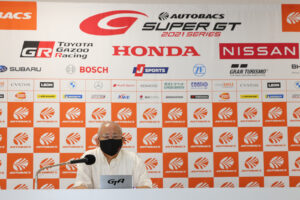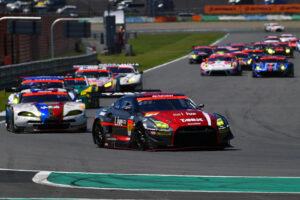After an unscheduled two month-long hiatus, Super GT was finally back in action at Twin Ring Motegi this weeekend. Before the green flag fell, GTA chairman Masaaki Bandoh invited the press to talk about the plans for 2022 and beyond, revealing that they’re currently considering a „Winter Series“ for early 2023 as both international rounds in Thailand and Malaysia won’t be featured in 2022 either due to the ongoing pandemic.
No international races for 2022. Potential “Winter Series” in Malaysia and Thailand in consideration for early 2023
 GTA chairman Masaaki Bandoh opened the press conference at Twin Ring Motegi by explaining that due to the ongoing pandemic, it’ll be difficult to conduct both overseas rounds in 2022. Therefore, Super GT is currently planning to hold all 8 championship rounds in Japan again. Unlike this year, next season’s domestic calendar could see a slight change though, with both Fuji Speedway and Suzuka Circuit holding two rounds each. The rest of the schedule would remain the same with Okayama International Circuit, Sportsland SUGO, Autopolis Circuit and Twin Ring Motegi all getting one race each. In addition, Masaaki Bandoh wants to propose an idea that all people involved in SUPER GT will get two weeks off in the middle of the season to give them a chance to recharge their energy as an overcrowded schedule is a big problem in the motorsports industry every year. The 2022 schedule will be announced as soon as the JAF has given their approval.
GTA chairman Masaaki Bandoh opened the press conference at Twin Ring Motegi by explaining that due to the ongoing pandemic, it’ll be difficult to conduct both overseas rounds in 2022. Therefore, Super GT is currently planning to hold all 8 championship rounds in Japan again. Unlike this year, next season’s domestic calendar could see a slight change though, with both Fuji Speedway and Suzuka Circuit holding two rounds each. The rest of the schedule would remain the same with Okayama International Circuit, Sportsland SUGO, Autopolis Circuit and Twin Ring Motegi all getting one race each. In addition, Masaaki Bandoh wants to propose an idea that all people involved in SUPER GT will get two weeks off in the middle of the season to give them a chance to recharge their energy as an overcrowded schedule is a big problem in the motorsports industry every year. The 2022 schedule will be announced as soon as the JAF has given their approval.
Since the GTA still wants to race in Thailand and Malaysia (editor’s note: the comeback in Sepang was originally scheduled for 2020), the GTA is currently considering to hold a “Winter Series” in early 2023. In order to give the teams enough time to prepare, the 2022 season is set to end in early instead of late November like this year. Except for this year, the winter tests are usually being held in Malaysia. But for 2023, the GTA is looking into whether it would be possible to race in Thailand and Malaysia in January or February before returning to Japan in March for the official pre-season test. This would also mean that the 2023 season would kick off in the third instead of the second week of April. As Masaaki Bandoh pointed out, the plans for a “Winter Series” in early 2023 are currently only under consideration as they first have to talk with the local organizers and promoters.
Bandoh reconfirms plans for longer races in 2022
 At the Fuji 500km press conference, the GTA chairman revealed Super GT’s plans to increase the race distance in 2022 as a first step to carbon neutrality in the future. The idea is to require tyres with higher durability and engines with better fuel economy. By doing so, the GTA wants to reduce the number of tyres brought to the circuit each weekend. Of course, it would be possible to just lower the race distance, to reduce the tyre and fuel consumption. However, as Masaaki Bandoh pointed out, this wouldn’t lead to any technological progress. One of Super GT’s goals is to be platform for technological advancements, the GTA chairman explained. Bandoh thinks that by making the races slightly longer, the teams wouldn’t be able to pit after just 1/3 of the distance as they would run out of fuel near the end (editor’s note: the idea is that the non-endurance rounds would remain a one-stop race). So, not only would it require a better fuel efficiency, but also tyres that last until that point since all teams are required to start with the rubber that was used in qualifying (editor’s note: either Q1 or Q2 depending on the lottery). A final decision will be made after consulting with all the involved manufacturers.
At the Fuji 500km press conference, the GTA chairman revealed Super GT’s plans to increase the race distance in 2022 as a first step to carbon neutrality in the future. The idea is to require tyres with higher durability and engines with better fuel economy. By doing so, the GTA wants to reduce the number of tyres brought to the circuit each weekend. Of course, it would be possible to just lower the race distance, to reduce the tyre and fuel consumption. However, as Masaaki Bandoh pointed out, this wouldn’t lead to any technological progress. One of Super GT’s goals is to be platform for technological advancements, the GTA chairman explained. Bandoh thinks that by making the races slightly longer, the teams wouldn’t be able to pit after just 1/3 of the distance as they would run out of fuel near the end (editor’s note: the idea is that the non-endurance rounds would remain a one-stop race). So, not only would it require a better fuel efficiency, but also tyres that last until that point since all teams are required to start with the rubber that was used in qualifying (editor’s note: either Q1 or Q2 depending on the lottery). A final decision will be made after consulting with all the involved manufacturers.
Various trials to achieve carbon neutrality in the future
 GTA chairman Masaaki Bandoh repeated his intentions to achieve carbon neutrality in the future. Like he explained at Fuji Speedway back in May, the plan is to introduce e-fuel, which is also planned for other racing series such as Formula 1 or WRC, alongside the new GT500 regulations in 2024. However, as explained at today’s press conference, various challenges lie ahead of the GTA. One of those points depends on the national policies and what direction the Japanese Ministry of Economy, Trade and Industry (METI) will take towards carbon neutrality in 2030. As said last time, this involves the decision whether to use E10 or E20 octane rating. Such points are currently being discussed with the oil industry. The GTA is also consulting with Toyota, Honda and Nissan regarding the costs and where the series could start to achieve its environmental initiatives in the future. The talks also involve the important relationship with Super Formula since Toyota and Honda are using the same engines in Japan’s top formula series. Once again, Masaaki Bandoh confirmed that he doesn’t want to impair the five senses, so they’re currently considering how to realize all future goals without damaging that belief.
GTA chairman Masaaki Bandoh repeated his intentions to achieve carbon neutrality in the future. Like he explained at Fuji Speedway back in May, the plan is to introduce e-fuel, which is also planned for other racing series such as Formula 1 or WRC, alongside the new GT500 regulations in 2024. However, as explained at today’s press conference, various challenges lie ahead of the GTA. One of those points depends on the national policies and what direction the Japanese Ministry of Economy, Trade and Industry (METI) will take towards carbon neutrality in 2030. As said last time, this involves the decision whether to use E10 or E20 octane rating. Such points are currently being discussed with the oil industry. The GTA is also consulting with Toyota, Honda and Nissan regarding the costs and where the series could start to achieve its environmental initiatives in the future. The talks also involve the important relationship with Super Formula since Toyota and Honda are using the same engines in Japan’s top formula series. Once again, Masaaki Bandoh confirmed that he doesn’t want to impair the five senses, so they’re currently considering how to realize all future goals without damaging that belief.
A “vaccination passport” for paddock members?
 According to the latest numbers, around 70% of people over the age of 65 have already received their first vaccination jab in Japan. The Japanese government is thinking about introducing a “vaccination passport” for all fully vaccinated citizens for overseas travels, which would reduce the required quarantine time from 14 down to three days. Masaaki Bandoh got asked if something similar could get introduced for Super GT’s paddock workers. The GTA chairman explains that the GTA is currently requiring a negative PCR test. The problem is that there’s a mix of people who already got fully vaccinated, only got one jab or haven’t received their first injection at all. If everyone would be vaccinated, it would be possible to change the current operation. The GTA chairman also confirmed that of the 1,800 tested people only one got tested positive.
According to the latest numbers, around 70% of people over the age of 65 have already received their first vaccination jab in Japan. The Japanese government is thinking about introducing a “vaccination passport” for all fully vaccinated citizens for overseas travels, which would reduce the required quarantine time from 14 down to three days. Masaaki Bandoh got asked if something similar could get introduced for Super GT’s paddock workers. The GTA chairman explains that the GTA is currently requiring a negative PCR test. The problem is that there’s a mix of people who already got fully vaccinated, only got one jab or haven’t received their first injection at all. If everyone would be vaccinated, it would be possible to change the current operation. The GTA chairman also confirmed that of the 1,800 tested people only one got tested positive.
Regarding this, Masaaki Bandoh also explained that they had no other choice than to postpone the Suzuka round as the Mie Prefecture was under a state of emergency with limited hospital beds, which could’ve been a problem in case of an accident. The race will now take place on August 21-22 – the original date of the cancelled Suzuka 10 Hours. Initially, there were plans to even hold the race at the end of the season, but they decided to use the empty late August slot instead.
Copyright Photos: GT Association (GTA)

